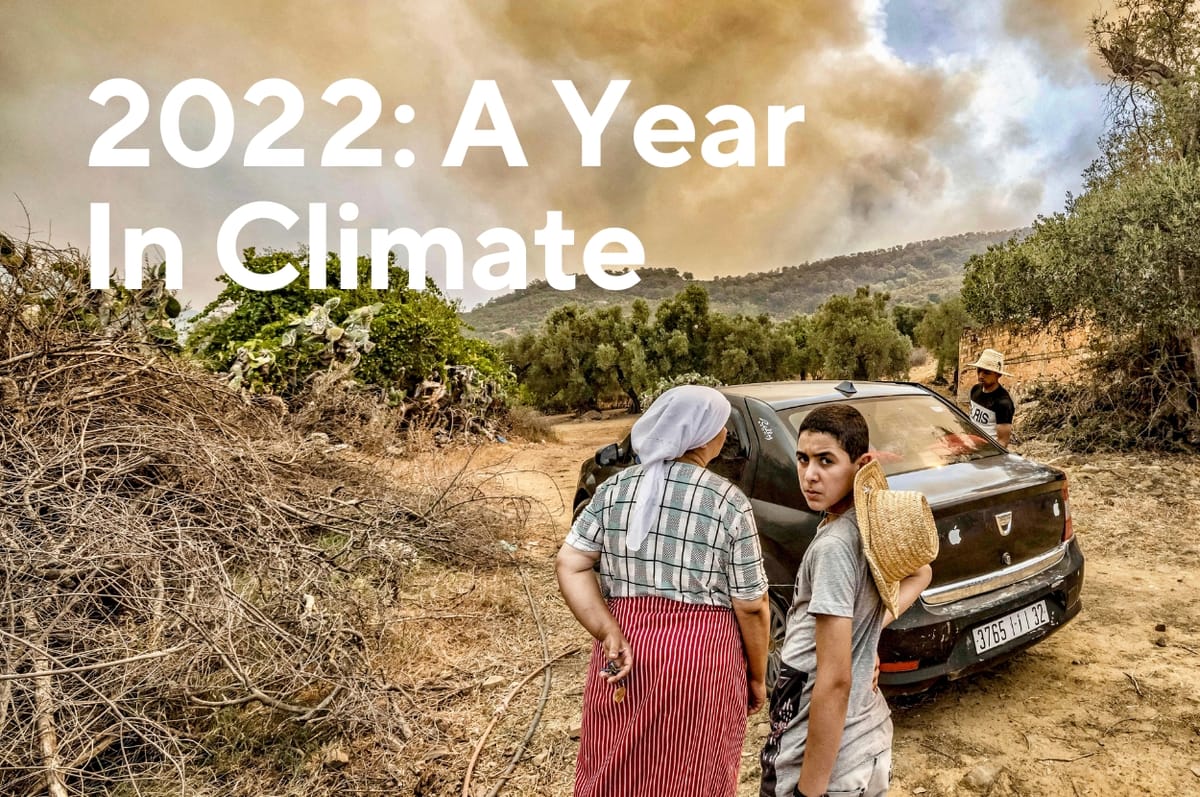2022: A Year In Climate
From record-breaking heatwaves to the devastating floods in Pakistan, the effects of climate change were felt around the world in 2022.

From record-breaking heatwaves to the devastating floods in Pakistan, the effects of climate change were felt around the world in 2022.
But it wasn’t all bad news.
Here are some of the biggest climate stories of the year.
Extreme heat caused heatwaves and major wildfires in China, as well as several countries in western Europe and northern Africa, including Spain, Portugal and Morocco.
Devastating floods left one third of Pakistan underwater.
Pakistan was in need of major humanitarian aid after extremely heavy rainfall has caused intense floods throughout the country, killing at least 119 people in a day and affecting more than 30 million people.
Monsoon season usually brings rain to South Asia at the beginning of June, but heavy rains have hit Pakistan in epic proportions this year.
Pakistan’s Federal Minister for Climate Change, Sherry Rehman, said that one third of the country is underwater and that Pakistan “resemble[d] a small ocean”.
Video footage and images showed homes completely underwater and bridges collapsed as rushing water passed through.
On Monday Aug. 29, the National Disaster Management Agency (NDMA) said at least 1,061 people had died since the rains started mid-June.
And Tuvalu was forced to become the first country to recreate itself in the metaverse due to rising sea levels.
As its land disappears from rising sea levels, the Pacific island nation of Tuvalu has announced that it will recreate itself in the metaverse in order to preserve its land, history and culture.
Tuvalu’s foreign minister Simon Kofe announced the project in a video aired at the UN’s climate conference COP27, where a year earlier, he gave a powerful speech calling for urgent climate action while standing knee deep in the ocean.
“Since COP26, the world has not acted,” Kofe said from a small islet that was likely to be the first to be submerged from rising sea levels as a result of global warming. “And so, we in the Pacific have had to act.”
“Our land, our culture, our ocean are the most precious assets of our people. And to keep them safe from harm, no matters what happens in the physical world, we’ll move them to the cloud,” he said.
But the UN recognized the right to a clean and healthy environment as a universal human right.
Rich countries finally agreed to pay for climate damages in poor countries.
In a first, rich countries have agreed to create a fund to pay for the damages that poor and vulnerable countries have already been bearing the brunt of as a result of climate change.
The “loss and damage” fund was announced in the early hours on Sunday Nov. 20 at COP27, the UN’s annual climate change conference, in Egypt’s Sharm El-Sheik, after two weeks of negotiations between nearly 200 countries.
For years, wealthier nations have rejected discussing compensation for loss and damage – funding costs that countries can’t avoid or adapt to.
Loss and damage refers to the harms vulnerable states are already suffering as a result of climate change, such as rising sea levels.
French teens used parkour to turn off store lights in Paris at night to help save energy.
Videos of teen parkour athletes switching off lights at night in Paris circulated on social media, as France launched an energy efficiency plan following Russia’s cutoff of gas to Europe.
They are seen jumping and climbing up walls, gutters and balconies to flip off the light switches of shop signs that have been kept on all night in an attempt to fight against light pollution and promote energy conservation.
The Paris-based On The Spot Parkour group of 20 members can be found on night tours around Paris several times a month, searching for illuminated signage.
While most stores have lit up window displays that cannot be turned off, the group seeks out emergency switches two to four meters high on the outside of storefronts.
“Everyone can contribute in their own way” to save energy, Kevin Ha, the leader of the collective, said.
The population of endangered frogs exploded in Switzerland after people kept on digging ponds for 20 years.
In Switzerland, high urbanization, infrastructure and invasive species have destroyed the habitat of many amphibians, leading to a worrying decline in their population.
In 1999, after observing the decline of the European tree frog, the Aargau region decided to launch a mass conservation effort against the loss of amphibians.
State authorities, non-profits, landowners and volunteers then worked together for 20 years to create 422 ponds, forming new habitats for amphibians.
In 1999, scientists could only find the European tree frog in 16 areas in the Reusstal Valley, but by 2019, the species was found in 77 locations, according to the BBC.
32 percent of eight endangered amphibian populations have stabilized, and more than half saw a population increase in the region, scientists told BBC.
“The key message is that it pays to do something, even if it feels overwhelming,” the head of the research study said.
India and Canada banned single-use plastics to reduce plastic waste
India imposed a national ban on single-use plastics to reduce pollution on Friday July 1.
The country produces over 25,000 tons of plastic waste every single day, according to the Central Pollution Control Board.
The ban, which will be rolled out in three stages, will prohibit manufacturing, importing, stocking, distributing, selling and using single-use plastic, including polystyrene.
As part of the first phase, 19 single-use plastic items are now banned, including straws, cutlery, plastic sticks for balloons, candy and ice cream packaging and cigarette packets.
Meanwhile, the Canadian government banned companies from producing or importing single-use plastics, including most plastic bags, takeout containers, cutlery and straws.
It will then bar companies from selling single-use plastics by the end of 2023 and exporting them by the end of 2025, to provide time for businesses to transition and deplete their existing stocks, according to a government statement.
The move is part of Canada’s ongoing efforts to reduce plastic waste and promote a healthy environment, according to the health minister.
And a Swedish company trained crows to pick up cigarette butts to help clean up street litter.
A Swedish company has been training crows to pick up cigarette butts in an effort to reduce the cost of cleaning litter off the streets in Södertälje, near Stockholm.
Corvid Cleaning has developed a pilot program to train crows to pick up trash and throw them in a machine called a bird bin, which then separates the objects and rewards birds that brought in litter with snacks.
The company decided to start with cigarette butts as they make up more than 60% of all litter items and are simple for the bird bin to identify as trash, the founder of the project, Christian Günther-Hanssen, said on the website.
Günther-Hanssen believes that the initiative can help save at least 75% of cleaning costs involving cigarettes.





